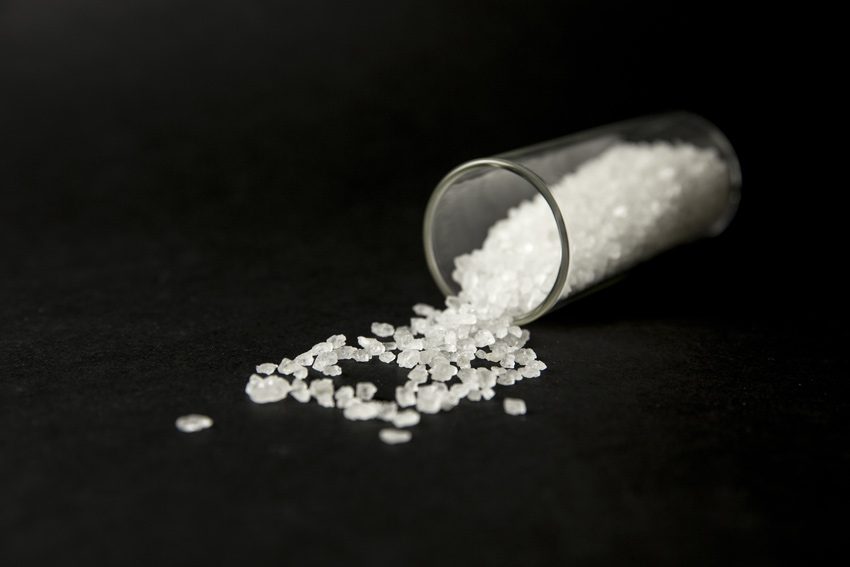“Bath salts” refers to a highly addictive and dangerous group of drugs that are chemically made in a lab to resemble cathinone, a natural stimulant from the khat plant commonly found in east Africa and southern Arabia. Bath salts are very similar in their effects to methamphetamine and MDMA.
How to Recognize Bath Salts
Not all bath salts are the same. There are various ingredients and compounds added to them to change how they function. As lab-made drugs, they can typically be made to be much stronger than natural cathinone and often have unknown ingredients. That can put people at risk for complications and create harmful effects.
Typically, bath salts look like a brown or white crystal-like powder. Sold illegally, they are often found in foil packages or plastic bags. Sometimes, they will be sold with statements such as “not for human consumption” on them as an attempt to hide what they are from authorities. Manufacturers may label them as jewelry cleaner, plant food, or other terms to mask what they are truly selling. Bath salts are sold online or in drug product stores, making it more difficult for authorities to spot them.
How They Are Used
Bath salts are nothing like traditional salts, like Epsom salts, used in a bath. They are often used in the same way as Molly or ecstasy are used. Sometimes they are a more affordable option than cocaine. Most commonly, people swallow or snort bath salts. However, they can also be injected.
They produce a fast high that can result in:
- An increased sex drive
- A need to be socially interactive
- Happiness or euphoria
- Nervousness or paranoia
- Hallucinations
What Makes Them Dangerous?
Bath salts can impact the function of the brain. While they heighten energy, this energy comes at a price of feeling anxious or agitated as well. That’s because this substance interferes with the central nervous system. They disrupt the way messages are sent between cells, making intercellular communication difficult.
Bath salts also increase the production of dopamine, the feel-good neurotransmitter. Dopamine triggers the body’s reward system, stimulating the brain to seek out those pleasurable feelings over and over again. Regular or heavy use of bath salts teaches the brain to seek out those drugs again, leading to intense motivation to use the drug and, in some cases, addiction.
When a person tries to stop taking this substance, they may have intense feelings of withdrawal as a result. Withdrawal can cause the following:
- Paranoia
- Depression
- Anxiety
- Insomnia
- Tremors
Experiencing withdrawal is a sign that the body is now physically dependent on the drug. Tolerance has likely developed as well, creating the need for more of the drug to achieve the same experience.
Overdose is a risk with these drugs as well. Too much of the substance may overpower the brain, leading to a slowing down of the central nervous system, heart, and lungs. A person can experience coma or death from overdosing on bath salts.
Signs of Addiction
Those who suspect a loved one is using or addicted to bath salts need to help that individual seek out care and treatment as soon as possible. Common signs of addiction include:
- Periods of increased alertness and energy, sometimes short-lived
- Increased libido
- Wanting to interact socially and feeling enhanced empathy with others
- Injection marks on the arms
- Withdrawal from activities and people
- Changes in personality
- Severe “downs” or periods when they feel very bad and have no energy
- Drug-seeking behavior
What Can Be Done to Help Those Using Bath Salts?
It may not be possible for a person using this drug to stop on their own due to the dependence that forms when using this substance. However, help is available and may include:
- Drug detox in cases of previous relapse or overdose, and sometimes when a person has intense dependence on the drug
- Intensive outpatient or partial hospitalization treatment
- Cognitive-behavioral therapy
- Motivational enhancement therapy
- Contingency management or motivational incentives
- Individual therapy programs
- Group therapy programs
How much and the type of care a person needs depends on multiple factors, including how long they’ve used and how much they are using. Many people also need help for co-occurring disorders, such as depression or anxiety, along with treatment for bath salts.
A consultation with an addiction recovery specialist at DK Solutions Group can help you or your loved one learn about available resources and decide on the best course of treatment. If you or your loved one is at risk, call today.

